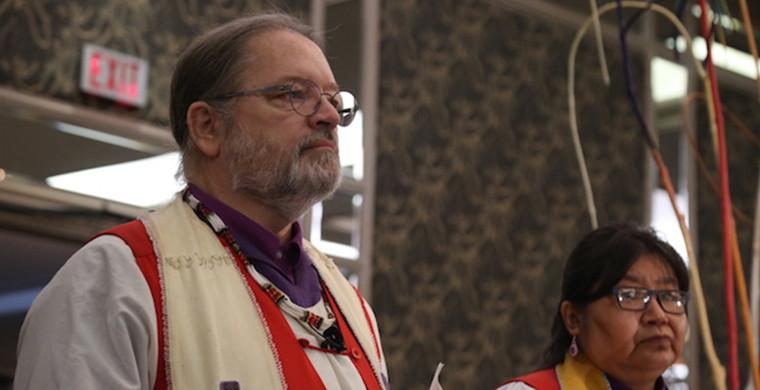CANADA: Three Indigenous bishops blast same-sex marriage vote
National Indigenous Anglican Bishop Mark MacDonald, left, and Bishop Lydia Mamakwa, of the Indigenous Spiritual Ministry of Mishamikoweesh, during the opening worship at General Synod 2016. Photo: Art Babych
By David W. Virtue DD
wwvirtueonline.org
Sept. 24, 2016
The Anglican Church of Canada's three Indigenous bishops have blasted their Church's decision to approve, if only provisionally, changes to the marriage canon, which would allow same-sex marriages. Most believe the ACoC will rubber stamp that decision at their next General Synod in 2019.
Following the July vote on same-sex marriages at General Synod, which was a confusing and got passed by just one vote, National Indigenous Bishop Mark MacDonald; Bishop Lydia Mamakwa, of the Indigenous Spiritual Ministry of Mishamikoweesh; and Bishop Adam Halkett, of Missinipi, released a joint statement they say was requested by an Indigenous circle that met after the results of July's vote were revealed.
The bishops did say that while they did not speak for all Indigenous peoples, they said they consulted "broadly and deeply" with many who voiced displeasure both with the decision and the process it was made, and expressed desire for a more self-determined Indigenous Anglican community in Canada.
"We do not agree with the decision and believe that it puts our communities in a difficult place in regards to our relation and community with the Anglican Church of Canada," the bishops said.
The bishops said they intended to discern their exact course of action "in the days ahead," and committed themselves to continuing in their conversation "with the Anglican Church of Canada in regards to self-determination and mutual cooperation in our Anglican Christian ministry."
"We will proceed towards self-determination with all urgency," they said.
They said they would also "seek ways to continue our conversation with the LGBTQ [Lesbian, Gay, Bisexual, Transgender and Queer] communities and individuals, affirming our earlier statements of love and welcome."
They also called for a church inquiry into the process by which July's decision was made.
"We believe that this entire incident calls for a review and rethinking of the ways that the Church conducts its business," the statement reads. "We have resolved to work with you to see that we never have to be in this kind of situation again."
They were especially pained by the "silencing" of an elder during debate on the floor of synod, and called for an apology to the elder.
The Canadian Charter of Rights, the bishops said, guaranteed the Church's right to "complete its pastoral work in marriages," and also that the country's Indigenous peoples are "self-determining with regard to basic cultural and social matters." This guarantee, they said, is "fundamental to the Nation-to-Nation relationship which is at the base of Indigenous Rights, reconciliation and a promising future for all of Canada."
These rights, they say, are also affirmed by the UN Declaration on the Rights of Indigenous Peoples (UNDRIP). Given this, the bishops say, "we are deeply disturbed and disappointed that so little attention was paid to our pastoral and social self-determination and the right to free, prior and informed consent."
That Indigenous people must give "free, prior and informed consent" to what is done on their territory is one of the principles of UNDRIP.
Indigenous Anglican elders, the bishops say, should have been "actively involved" with discussions to change the marriage canon. But neither discussion of the matter nor This Holy Estate--the report of the Commission on the Marriage Canon--were translated into Indigenous languages, they said.
The bishops said they voted against changing the marriage canon not as a statement against anyone, but as an expression of their own understanding of marriage--an understanding they say is closely tied to their concept of creation itself.
"It is our understanding that, while homosexual persons have always had a place in our societies, same-sex marriage, itself, has not," the bishops say. "We find in both our reading of Creation and Scripture the unique relationship of Man and Woman. The difference between the two, coming together in the miracle of a unique spiritual communion, is essential to the way we understand marriage--but not only marriage, it is the way we understand the Land, the way we understand Creation."
The change to the canon, the bishops acknowledged, includes an "opt-in" clause, so that same-sex marriages would be permitted in a diocese only if authorized by the bishop. But they object to the changes made in the definition of marriage.
"Although the canon does not force anyone to do anything, the language of the revised canon changes the fundamental meaning of marriage to make it gender neutral," the statement read. "This is both a significant and unacceptable change to our communities, who still find male and female as essential to their understanding of the marriage ceremony."
The three bishops concluded with this statement; "We are deeply sad that, at a time in which the Indigenous and non-Indigenous Peoples of the Anglican Church of Canada warmly embraced each other and a new future...we came to such divisiveness," the bishops say. "We are deeply sorry for any ways that our actions--words and acts of sin by doing and/or not-doing--contributed to this outcome and will seek to do our very best in the future to embody the reconciliation that we see in Jesus. We believe that Christ is present among us, by His own power and promise, and we will look for Him to guide us into a better future."
"We call for the Church to establish an inquiry into the process this decision was made. This was not the best for Indigenous Peoples, we can only believe it is not the best for others."
Twenty-six bishops, or 68.4%, voted in favor of the motion to change the church's marriage canon to allow for same-sex marriages, and 12 voted against.
A total of seven bishops publicly dissented from the same-sex marriage vote.
END














